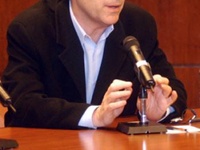‘Treading on New Ground’
While it’s hard to predict how strongly a U.S. attack on Iraq will reverberate on campus, many believe Harvard is sure to live up to its legacy of wartime tumult.
Some, such as Ignattieff, are already quick to compare campus sentiment to that of the Vietnam era, sensing deep disquietude that is “very profound.”
And others see the potential for even more agitation.
“There has been more anxiety than there was at the beginning of Vietnam,” Hoffmann says.
But not everyone who was around for the infamous protests of the 1960s are looking to revive that legacy.
“I am not sure now of the wisdom of my opposition to the Vietnam War,” says Thernstrom, who led a Harvard teach-in against the war in the 1960s. “There was a naivete among those of us who opposed the war but did not foresee how terrible the [alternative] regime would be.”
Today, uncertainty over the future of the war is nearly all that unites Harvard’s divided campus.
“There will be a good many unintended consequences and the longer the war, the more it becomes unpredictable,” Kafadar says.
And Ignatieff says it is extremely difficult to predict the type of war this will be.
“[The result] does not depend on American shock or Blitzkrieg, but if Saddam has people willing to go down with him,” he says.
And as the nation readies itself for war, Harvard professors concede that the current situation is unprecedented.
“This will be the first of a different kind of war, one in which America as a sole superpower will intervene to test a doctrine,” Owen said. “We are treading on new ground.”
—Staff writer Jessica E. Vascellaro can be reached at vascell@fas.harvard.edu.









